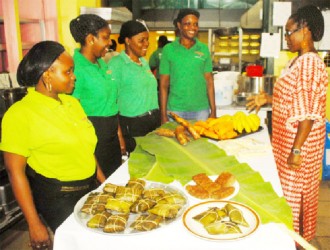When we met Karen Pollard on Tuesday evening she appeared amiable and relaxed despite admitting to having had a demanding day. She explained that the period immediately preceding Emancipation Day is usually filled with orders from clients for African sweetmeats like cassava pone, conkee, mauby and ginger beer – ”African snack foods,” she calls them. What she offers is a modest taste of some of the favoured foods of our foreparents. The practice over the years has been for her clients, individuals, offices and families to share these foods with families, friends and clients. It is a kind of unwritten tradition which she values as much as she values the patronage.
We talk about African dishes and about the fact that African cooking has never really ‘taken off’ as a commercial venture in Guyana. Cook up rice and metemgee are among the few exceptions to the rule. She says they were valued by our foreparents because of their “lasting” quality. “That is why they are called dried food. In those days the Africans had to walk with their food in the fields.”
If there may be a handful of African Guyanese who prepare authentic African dishes the tradition is not strong enough to sustain a commercial culture. So that the little that exists is confined mostly to families.

She believes that the advent of an African restaurant industry rests on “business people making decisions.” There is a market to be tested and the cultivation of taste takes time. She says that some of her customers have raised with her the issue of introducing a limited number of African dishes on her regular menu. “It’s a great idea but you have to work on it,” she says,
Karen was born and raised at Springlands. Her grandfather ran a ‘cake shop’ and her uncle operated a baker shop. She grew up around business.
The first Spicy Dish restaurant was established in 1986 and the brand moved to David Street, Kitty, the University of Guyana and to North Road close to the Post Office,
She believes that the key to creating a viable African cuisine industry lies in marketing. “There are competent cooks around and once we have our recipes and our formulas we would then need to market what we are offering”.
She believes that the marketing could be more challenging than the creation of the dishes. “People usually have their own conceptions of what they want to eat if you want to sneak something else in you have to market it.”
She believes that the ‘season’ of emancipation is likely to be the best time for the launch of an African Restaurant. “It is around this time that people make enquiries about African dishes,” she says. Two years ago she had responded but that was where it ended.
She concedes that the Spicy Dish is perceived in some quarters as a local cultural outpost. Both locals and foreigners sometimes descend upon the establishment in delegations looki8ng for “a taste of Africa.”
Much as she appreciates that kind of patronage Karen is an advocate for the greater popularization of African foods. “There really is no reason why we should not strive for an African food industry here,” she says. There are other challenges too. She points out that where Chinese dishes, for example, comprise mostly fast foods, African dishes must be “prepped.” That has implications for customer waiting. You can have a Chinese meal in a restaurant in twenty minutes. That does not apply in the case of African foods. It requires a higher level of organization.”
For Karen there is ’life’ beyond Emancipation Day and if she is prepared to continue to do her part to make the event meaningful she understands only too well that her decisions must make business sense. She embraces the idea of a greater dimension of Africanness in local cuisine though she concedes that, at least in the short term, such a venture is not in her business plans.





